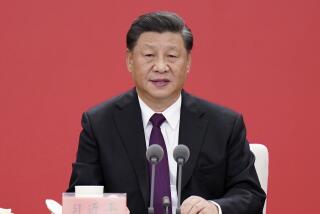Western Nations Open Way for Taiwan to Join GATT : Trade: Long negotiations overcome China’s objections. Membership process may take two years.
WASHINGTON — The United States and other Western governments have worked out a deal that will open the way for Taiwan to enter the General Agreement on Tariffs and Trade (GATT), the world’s main trading organization, according to Bush Administration officials and Washington-based diplomats.
Gaining admission to GATT has long been Taiwan’s top foreign-policy priority and will give its Nationalist government the sort of international recognition it has been seeking for more than a decade.
“It’s status. It means they’re a member of the club,” asserted Sen. Max Baucus (D-Mont.), who has been a leading congressional advocate of getting Taiwan into GATT.
GATT membership would also enable Taiwan--which now has $88 billion in foreign exchange reserves, more than any other country--to sit at the table with the world’s leading economic powers in making the rules for world trade. At the same time, obtaining GATT membership would require Taiwan to reduce its tariffs and to drop other barriers to imported goods.
The agreement, worked out after more than two years of negotiations, will be announced Sept. 29 at the next monthly meeting of the GATT Council in Geneva, the officials said. At that session, a special working group will be set up to work on Taiwan’s admission to GATT under the label “Chinese Taipei,” the same name under which Taiwan’s athletes compete in the Olympic Games.
The GATT deal is the second major diplomatic victory Taiwan has won from the West recently. The first was President Bush’s decision earlier this month to approve the sale of American-made F-16 warplanes to Taiwan.
Unlike the arms deal, however, the agreement on GATT was achieved with China’s cooperation, according to both Western and Chinese sources. “This is a consensus arrangement,” one senior Bush Administration official said.
Admitting Taiwan to GATT should take roughly two years, but the agreement later this month “is a final acceptance of their application and begins the process of membership,” explained another U.S. official.
China is also awaiting GATT membership, but Western governments have been reluctant to proceed because Beijing’s socialist system includes a series of restrictions and barriers to free trade. The Bush Administration is now pressing China to drop many of these restrictions in a series of trade negotiations that are scheduled to end next month.
China is still insisting that it should be admitted before Taiwan. But Beijing has been willing to go along with Taipei’s application, apparently because it hopes the eagerness of Western governments to admit Taiwan’s huge economy will prompt them to accept China first as part of the package.
Until recently, China was using its diplomatic clout with Western governments to block any move toward admitting Taiwan. Chinese officials argued that Taiwan is part of China and entry of Taiwan into the world trade group would be a violation of China’s sovereignty.
In an effort to overcome these objections, Taiwan applied in early 1990 to become a member of GATT not as a country but as a “customs territory.” China still balked, and officials in Beijing and Taipei became embroiled in a new fight over what name Taiwan would use. A compromise accord to use “Chinese Taipei” was reached over the past six weeks, U.S. officials said.
Chinese Foreign Minister Qian Qichen told a press conference in Bangkok on Sept. 11 that Beijing no longer opposed Taiwan’s application as a customs territory.
Taiwan’s entry into GATT could benefit U.S. businesses by forcing Taipei to eliminate many of its tariffs and restrictions on imports. However, one Administration official cautioned that Taiwan’s GATT membership might also have a negative impact on some American companies because it will require Taipei to give equal treatment to all foreign companies in bidding on government contracts.
At the moment, Taiwan has more leeway to favor American companies over European competitors for government contracts. And for political reasons, Taiwan has an incentive to favor the United States, which has been for more than four decades the main supplier of weapons for Taiwan’s armed forces and the main foreign protector of the country’s security.
It remains unclear what will happen two years from now if GATT authorities decide that Taiwan is ready for full membership but that China has not yet made the economic reforms necessary to qualify. However, a senior U.S. official said such a development is unlikely.
If Chinese officials in Beijing “make the moves they are now making, they would be likely to qualify,” the official said. “. . . And I don’t think Taiwan is going to kick if the People’s Republic of China gets in first.”
Keeping Track of Trade
Here is some background on GATT, the Geneva-based body that supervises international trade: * Established: By the United Nations in January, 1948.
* Membership: 103 nations.
* Mission: To administer world trading rules and tariff structures.
* Timetable for Taiwan: It should take about two years before Taiwan achieves full membership.
* California connection: The rules of GATT seek to discourage protectionist policies that inhibit the flow of trade. Thus, by encouraging greater trade, GATT would benefit Southern California because the region’s ports handle more trade coming into the United States than any other American ports, providing the Southland with a thriving export-import industry and thousands of jobs. Taiwan, which exports most of its U.S.-bound products through California ports, is expected to expand its trade with the United States. Taiwan’s entry could benefit U.S. businesses by forcing Taipei to eliminate many of its current tariffs and restrictions on imports.
Source: Times Staff
More to Read
Sign up for Essential California
The most important California stories and recommendations in your inbox every morning.
You may occasionally receive promotional content from the Los Angeles Times.










